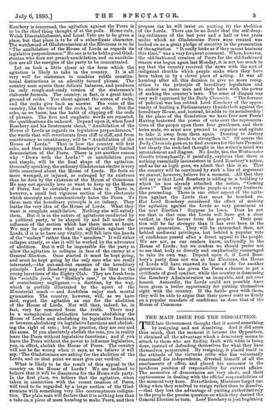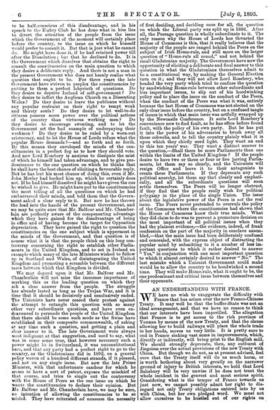THE MAIN ISSUE FOR THE DISSOLUTION. T HE late Government thought
that it scored something by resigning and not dissolving. And it did score thus much, that the moment it became the Opposition, it obtained all the advantage which a democracy seems to attach to those who are finding fault with what is being done, instead of defending themselves for what they have themselves perpetrated. By resigning, it placed itself in the attitude of the virtuous critic who has voluntarily reassumed his independence, divested himself of all the emoluments of office, and placed his successor in the invidious position of responsibility for current affairs. The memories of democracies are very short, and their captiousness in dealing with the official responsibilities of the moment very keen. Nevertheless, Ministers forgot one thing when they resolved to resign rather than to dissolve, —that they lost the advantage of putting authoritatively to the people the precise question on which they desired the General Election to turn. Lord Rosebery is just beginning to be half-conscious of this disadvantage, and in his speech to the Eighty Club he has done what in him lies to divert the attention of the people from the issue which the Government of the moment will certainly place before the country, to the issue on which he himself would prefer to consult it. But that is just what he cannot do. He might have done it, if he had retained power till after the Dissolution ; but that he declined to do. It is the Government which dissolves that obtains the right to consult the constituencies on the main question to which they desire a deliberate reply. And there is not a man in the present Government who does not keenly realise what question that ought to be. For three years the late Government have striven to perplex the constituencies by putting to them a perfect labyrinth of questions. Do they desire to deprive Ireland of self-government ? Do they desire to inflict the Anglican Church on a Dissenting Wales ? Do they desire to leave the publicans without any popular restraint on their right to tempt weak and thirsty souls ? Do they desire to let well-to-do citizens possess more power over the political actions of the country than virtuous working men ? Do they desire to encourage sweating, and to let the Government set the bad example of underpaying their workmen ? Do they desire to be ruled by a worn-out aristocracy, and to let the House of Lords refuse what the popular House demands ?—and so forth and so forth. By this means they enveloped the minds of the con- stituencies in a perfect fog as to how they should vote. And now Lord Rosebery is anxious to dissipate the mist of which he himself had taken advantage, and to give pre- dominance to the one question on which he thinks that be shall have the best chance of eliciting a favourable reply. But he has lost his most chance of doing this, even if Mr. John Morley had backed him up, which he certainly does not. If he had himself dissolved he might have given the cue he wished to give. He might have put to the constituencies the most telling of all the questions on which he had embarrassed their minds, and told them that the Govern- ment asked a clear reply to it. But now he has thrown the lead into the hands of the present Government, and we may be quite sure that Mr. Balfour and Mr. Chamber- lain are perfectly aware of the compensating advantage which they have gained for the disadvantage of being in office and of having become the target for Opposition depreciation. They have gained the right to question the constituencies on the one subject which is uppermost in the minds of the Government, and that question is of course what it is that the people think on this long con- troversy concerning the right to establish other Parlia- ments in the United Kingdom, and to set in Ireland an example which many of the late Ministers wished to follow tip in Scotland and Wales, of disintegrating the United Kingdom and promoting a scramble between the different races between which that Kingdom is divided.
We may depend upon it that Mr. Balfour and Mr. Chamberlain will not miss the immense importance of marking this as the leading question on which they ask a clear answer from the people. The struggle has already lasted as long as the Trojan War, and it is time that it should be decisively and conclusively ended. The Unionists have never ceased their protest against the attempt to entangle this question with so many other very subordinate questions, and have even en- deavoured to persuade the people of the United Kingdom that there should be some such mode as the Swiss have established in their composite commonwealth, of asking at any time such a question, and getting a plain and clear answer to it. The late Government were always most indignant at that suggestion, and used to say, what was in some sense true, that however necessary such a power might be in Switzerland, it was unconstitutional here, and that auy party had a perfect right to go to the country, as the Gladstonians did in 1892, on a general policy woven of a hundred different strands, if it pleased, and not on any single issue. But now the late Prime Minister, with that unfortunate candour for which he seems to have a sort of patent, exposes the mischief of that course, and tries to single out the controversy with the House of Peers as the one issue on which he wants the constituencies to declare their opinion. But Mr. Balfour and Mr. Chamberlain have, we may be sure, 130 intention of allowing the constituencies to be so misled. They have reiterated ad nauseam the necessity of first deciding, and deciding once for all, the question on which the Liberal party was split up in 1886. After all, the Peerage question is wholly subordinate to it. The only reason why the House of Lords has thwarted the House of Commons is this, that it really believes that the majority of the people are ranged behind the Peers on the subject of Irish Home-rule, and still more on the larger question of " Home-rule all round," and not behind the small Gladstonian majority. The Government have now the opportunity of eliciting a deliberate and final answer to this question in what the Gladstonians themselves admit to be a constitutional way, by making the General Election turn on it ; and they will not allow Lord Rosebery, who, headed the very party which tried to confuse the question by sandwiching Home-rule between other subordinate and less important issues, to slip out of his hoodwinking policy and to place the issue on the conduct of the Peers, when the conduct of the Peers was what it was, entirely because the last House of Commons was not elected on the only clear issue before the country, but on a confused tangle of issues in which that main issue was artfully wrapped up by the Newcastle Conference. It suits Lord Rosebery's convenience now to find fault, as he has often before found fault, with the policy of his own party. But he has put it into the power of his adversaries to brush away all these cobwebs, and to tell the country plainly what it is upon which they chiefly need light. They want an end to this ten years' war. They want a distinct answer to the question,—Shall there be more Parliaments than one within the limits of the United Kingdom ? If the people desire to have two or three or four or five jarring Parlia- ments, let them say so clearly, and the Unionists will resign Office and leave it to their antagonists to create these Parliaments. If they deprecate any such political anarchy, let them say that clearly and emphati- cally, and all the subordinate questions will soon settle themselves. The Peers will no longer obstruct, if they find that the people really wish for political polygamy in the place of the single Union. The issue about the legislative power of the Peers is not the real issue. The Peers never pretended to overrule the policy of the Commons where the constituencies had shown that the House of Commons knew their true minds. What they did claim to do was to prevent a premature decision on the most important of all political issues when they had the plainest evidence,—the evidence, indeed, of frank confession on the part of the majority in conclave assem- bled,—that the main issue had been deliberately confused and concealed, with the express object of distracting the popular mind by submitting to it a number of less im- portant questions to which it rather desired to answer "Yes," in conjunction with one most important question to which it almost certainly desired to answer " No." The last mistake which a Unionist Government could make would be to allow the country to be hoodwinked a second time. They will make Home-rule, what it ought to be, the one predominant and critical issue between themselves and their opponents.









































 Previous page
Previous page